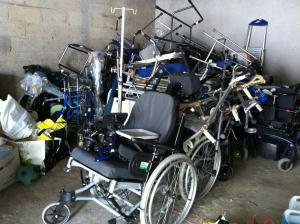Uhambo to empower families in developing economies through localised, disability-specific mobility solutions
The Uhambo Foundation NPC, alongside its partners, is launching a drive to raise awareness around the need for appropriate assistive technologies.
A child chained indoors by a disability misses out on play, on school, on friendship”
CAPE TOWN, WESTERN CAPE, SOUTH AFRICA, June 25, 2025 /EINPresswire.com/ -- Thousands of children and families in developing countries remain trapped in immobility due to limited access to assistive equipment that is appropriate for their local environments. Well-meaning but inappropriate donations often make things worse as imported wheelchairs that aren’t designed for African terrain or tailored to individual needs usually break down or may cause secondary complications. — Shona McDonald, Founder of Shonaquip Social Enterprise
"Across Africa, many children with disabilities are excluded from education, healthcare, and community life, not because of their impairments, but due to a lack of appropriate assistive technology," says Zelalem Dessalegn Demeke, Occupational Therapist, Founder of the Grand Assistive Technology Center and Lecturer, University of Gondar. "Without timely and suitable devices, these children face secondary health complications and restricted development. Addressing this gap is critical to closing inequality and unlocking their full potential," he adds.
In response to this issue, a collective of organisations working in the assistive technology and disability inclusion sectors in developing countries is urging the global community to come on board and support a new kind of solution that empowers people with disabilities through locally designed, durable wheelchairs tailored to their environment and needs.
The Uhambo Foundation NPC, trading as Shonaquip Social Enterprise, is joining forces with other stakeholders in the assistive technology sector to spotlight the challenges that arise when wheelchairs are poorly matched to both the user and their environment, and to drive action toward practical, sustainable solutions.
“A child chained indoors by a disability misses out on play, on school, on friendship,” says Shona McDonald, Founder of Shonaquip Social Enterprise. “And it doesn’t stop there, as families are often forced to choose between care and income. The whole entire household as well as the broader community are affected.”
The Uhambo Foundation further argues that just sending generic wheelchairs, while well-intentioned, is not enough to solve the problem. Many of the devices currently distributed are folding hospital transport chairs, originally designed for short-term indoor use on smooth floors.
These chairs are often not self-propelling and may feature fixed armrests and footplates, making independent movement and safe transfers extremely challenging, if not impossible, for users.
In parallel, another widespread practice involves the bulk collection and shipment of second-hand mobility aids. These items are often sourced from hospitals or donated privately, for example, when families clear out old equipment or when medical aid providers replace devices on a fixed schedule. The donated equipment is then packed into shipping containers and sent overseas, typically to developing countries, where they are distributed by local NGOs. However, this process usually happens without clinical assessment, proper fitting, or any infrastructure for repairs - raising significant concerns around safety, dignity, and long-term usability.
According to the Uhambo Foundation, real change will only come about when wheelchairs are designed with and for the people who use them, when they’re made locally, with training and support to maintain them.
“What actually helps,” McDonald explains, “is supporting local production, wheelchairs that are designed for local conditions, built by trained craftspeople, and distributed alongside repair training and user guidance.”
Locally produced assistive technology is better suited to meeting actual needs of the people and families in need of assistance, as well as holding the added benefit of creating jobs for people with disabilities, and empowering families, rather than sidelining them.
Reiterating these sentiments, Demeke adds that "African-led solutions are vital because local experts understand the cultural and environmental context. Sustainable systems must be built locally, using appropriate materials and integrating follow-up care," he explains. Listen to Zelalem Demeke's remarks here as he articulates the challenges around inappropriate assistive technology.
By focusing on community-based solutions, the initiative not only provides mobility but also creates employment, often for people with disabilities themselves. This sustainable model ensures dignity, independence, and long-term impact.
“It’s not just about movement. It’s about freedom, education, income, and dignity,” McDonald adds. “Mobility is a basic human right, and one we can all help make a reality.”
Shonaquip Social Enterprise invites individuals, organizations, and partners to join the movement. Support can take many forms: financial donations, advocacy, or simply sharing the message.
Anneke Burns
ABPR on behalf of Uhambo Foundation
+27 71 423 0079
email us here
Visit us on social media:
LinkedIn
Would you help if your child could not go outside because they are chained indoors?
Legal Disclaimer:
EIN Presswire provides this news content "as is" without warranty of any kind. We do not accept any responsibility or liability for the accuracy, content, images, videos, licenses, completeness, legality, or reliability of the information contained in this article. If you have any complaints or copyright issues related to this article, kindly contact the author above.

